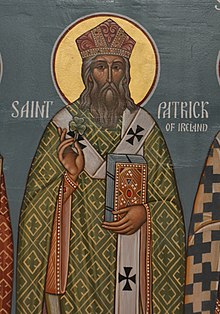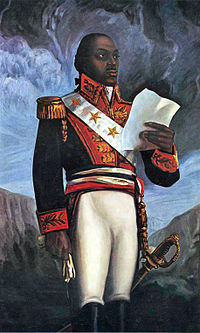Catholic Church and slavery
[7] While the Age of Discovery greatly increased the number of slaves owned by Christians, the response of the clergy, under strong political pressures, was ineffective in preventing the establishment of slave-owning societies in the colonies of Catholic countries.
[5] An early shipment of Black Africans during the transatlantic slave trade was initiated at the request of Bishop Las Casas and authorized by Charles V, Holy Roman Emperor in 1517.
They teach that slavery is not unlawful, firstly, when it proceeds from a legitimate war or voluntary sale; secondly, provided it respects the soul, body, family, and instruction of the slave.
[40] In 340 the Synod of Gangra in Asia Minor condemned certain Manicheans for twenty practices including forbidding marriage, not eating meat, urging that slaves should liberate themselves, abandoning their families, asceticism and reviling married priests.
Moreover, quoting partly from Paul the Apostle, Chrysostom opposed unjust slavery by giving these instructions to those who owned slaves: "'And ye masters', he continues, 'do the same things unto them'.
St Thomas Aquinas in mid-thirteenth century accepted the new Aristotelian view of slavery as well as the titles of slave ownership derived from Roman civil law and attempted—without complete success—to reconcile them with Christian patristic tradition.
"[60]Brumley claimed, regarding early Christianity and slavery:[61] In 340, the Synod of Gangra in Asia Minor, condemned certain Manicheans for a list of twenty practices including forbidding marriage, abandoning their families, slaves despising masters and running away under the pretext of piety, false asceticism and reviling married priests.
[citation needed] The main thrust of the church's policy on slavery in early medieval Europe was to abolish the enslavement of previously free Christians.
In the early thirteenth century, official support for some kinds of servitude was incorporated into Canon Law (Corpus Iuris Canonici), by Pope Gregory IX.
Saint Paul was the first of many authorities to say that slaves should be treated kindly, and that manumission (already common in Roman life) was encouraged, especially on the conversion or death of the owner.
He used his position as chaplain to the aristocrat in charge of the French galley fleet to run missions to the slaves and ameliorate their conditions, without seriously challenging the galley-slave system itself.
"As a consequence of the wars against the Mussulmans and the commerce maintained with the East, the European countries bordering on the Mediterranean, particularly Spain and Italy, once more had slaves: Turkish prisoners and also, unfortunately, captives imported by conscienceless traders .... this revival of slavery, lasting until the seventeenth century, is a blot on Christian civilization".
[74][75] Pope Urban VIII confirmed this (7 October 1462, Apud Raynaldum in Annalibus Ecclesiasticis ad ann n.42), referring to those covered by the prohibitions of Pius II as "neophytes".
We [therefore] weighing all and singular the premises with due meditation, and noting that since we had formerly by other letters of ours granted among other things free and ample faculty to the aforesaid King Alfonso—to invade, search out, capture, vanquish, and subdue all Saracens, and other enemies of Christ wheresoever placed, and the kingdoms, dukedoms, principalities, dominions, possessions, and all movable and immovable goods whatsoever held and possessed by them and to reduce their persons to perpetual slavery, and to apply and appropriate to himself and his successors the kingdoms, dukedoms, counties, principalities, dominions, possessions, and goods, and to convert them to his and their use and profit...[77] In 1456, Pope Calixtus III confirmed these grants to the Kings of Portugal and they were renewed by Pope Sixtus IV in 1481.
[79] But there were various other papal bull condemnations of Spanish and Portuguese practices of slavery and slave raids in the Canary islands and the New World in Sicut Dudum (1435) and Sublimis Deus (1537).
Comparing the situation to Spain's wars against the Moors, the clerics claimed that Muslims had knowledge of Jesus Christ and rejected him, so that waging a crusade against them was legitimate.
[86] In 1639 Pope Urban VIII forbade the slavery of the Indians of Brazil, Paraguay, and the West Indies, while purchasing non-Indian slaves for himself from the Knights of Malta,[87] probably for Papal galleys.
He (Satan) has stirred up some of his allies who, desiring to satisfy their own avarice, are presuming to assert far and wide that the Indians...be reduced to our service like brute animals, under the pretext that they are lacking the Catholic faith.
[96] In 1545, Paul repealed an ancient law that allowed slaves to claim their freedom under the Emperor's statue on Capitol Hill, in view of the number of homeless people and tramps in the city of Rome.
"We, by apostolic authority, warn and strongly exhort... that no one in the future dare to bother unjustly, despoil of their possessions, or reduce to slavery Indians, Blacks or other such peoples... We prohibit and strictly forbid any Ecclesiastic or lay person from presuming to defend as permissible this trade in Blacks under no matter what pretext or excuse, or from publishing or teaching in any manner whatsoever, in public or privately, opinions contrary to what We have set forth in these Apostolic Letters" (In supremo apostolatus, 1839).The Bull was ignored by the Spanish and Portuguese governments, both at that point of an anti-clerical cast and on poor terms with the Vatican.
[114] This is thought to have been a factor in the events of the Catholic Stono Rebellion in South Carolina in 1739, which involved slaves who planned to march to freedom in La Florida, and the New York Conspiracy of 1741.
Catholics only started to become a significant part of the overall US population in the 1840s with the arrival of Irish, German, and Southern Italian immigrants who congregated in urban Northern free areas.
Bishop John England of Charleston wrote several letters to the Secretary of State under President Martin Van Buren explaining that the Pope, in In supremo, condemned the slave trade, but not slavery per se.
[118] In In supremo apostolatus, Pope Gregory XVI admonished and adjured "all believers in Christ, of whatsoever condition, that no one hereafter may dare unjustly to molest Indians, Blacks, or other men of this sort;...or to reduce them to slavery...".
O'Connell, black abolitionist Charles Lenox Remond, and temperance priest Theobald Mathew organized a petition with 60,000 signatures urging Irish immigrants to support abolition.
During the Civil War, Bishop Patrick Neeson Lynch was named by Confederacy President Jefferson Davis to be its delegate to the Holy See to maintain diplomatic relations.
Sherman's military campaigns of 1864 and 1865 freed many slaves, who joined his marches through Georgia and the Carolinas in the tens of thousands, although his personal views on the rights of African Americans and the morality of slavery were more nuanced.
[11] The Vatican II document Gaudium et spes (Pastoral Constitution on the Church in the Modern World) stated, "Whatever violates the integrity of the human person, such as mutilation, torture...whatever insults human dignity, subhuman living conditions, arbitrary imprisonment, deportation, slavery ... the selling of women and children; as well as disgraceful working conditions, where men are treated as mere tools for profit, rather than as free and responsible persons; all these things and others of their like are infamies indeed ... they are a supreme dishonor to the Creator.
This in no way invalidates the clear and consistent teaching against the unjust slavery that came to prevail in Africa and the Western Hemisphere, first in Central and South America and then in the United States, for approximately four centuries.
He prefaced the passage in Gaudium es spes with "Thirty years later, taking up the words of the Council and with the same forcefulness I repeat that condemnation in the name of the whole Church, certain that I am interpreting the genuine sentiment of every upright conscience".





